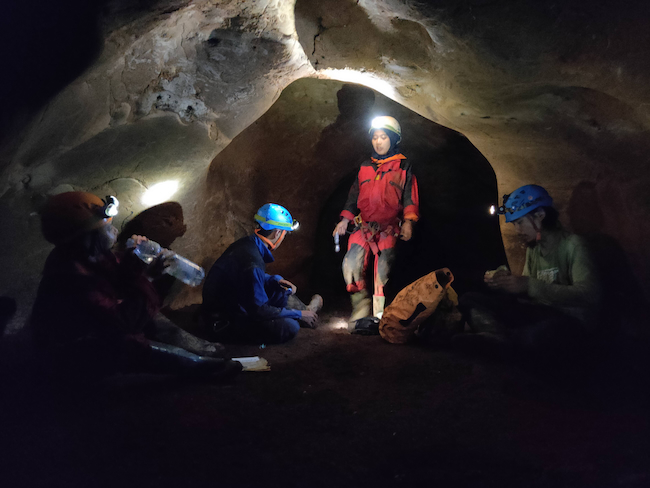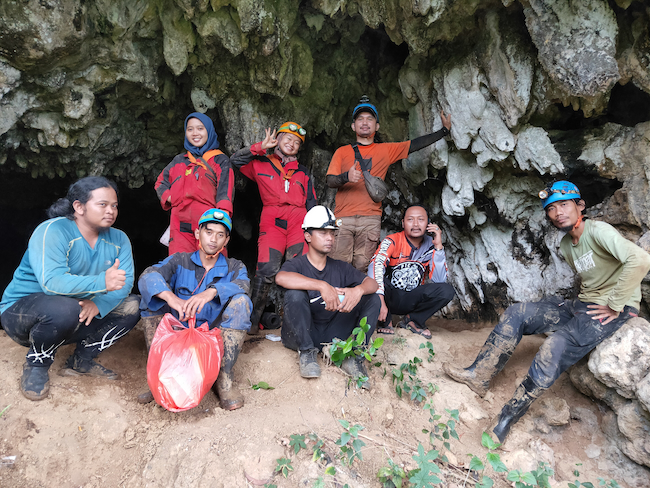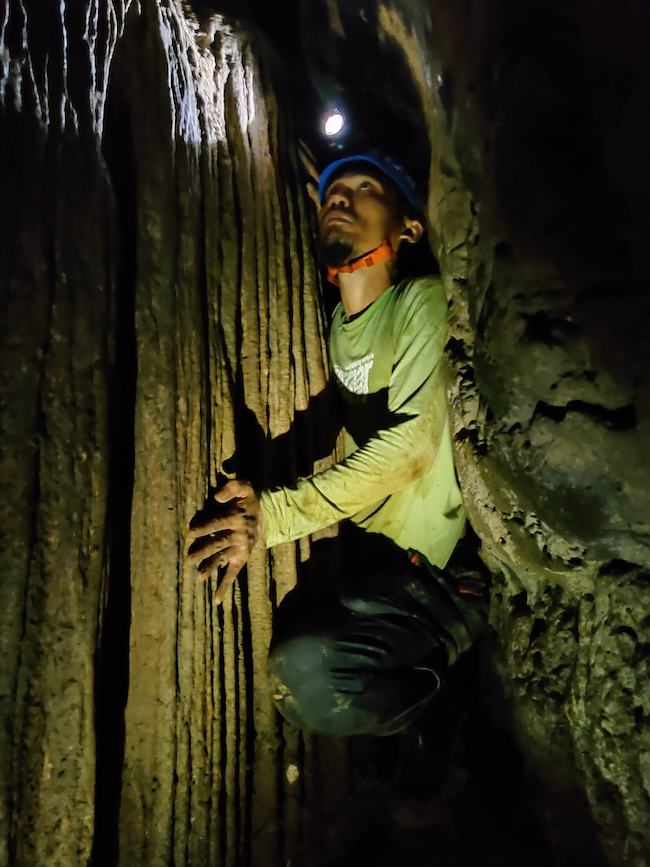How caving taught me to love the Trenggalek hills, and hate the mine
Jhe Mukti (interviewed by Gerry van Klinken)
Being deep inside a limestone cave is a healing experience. I am in front, the leader, checking out the way forward. The others behind me are making their measurements. Should we continue? Pause? Go back? These are not ideal conditions for a human being. It is a pitch black tunnel. You are always on your guard. You feel scared. I think to myself: ‘This is like a spiritual journey. When we are dead, buried, will it be like this in the bowels of the earth?’
We can smell the moisture, the wet clay, the bat guano. We feel in the moment. Sometimes we turn off our lights and remain still. We want to be in this darkness of eternity, a spiritual experience of peace. We open our eyes wide, but the darkness is total. Not a sound comes from outside. Just the drip-dripping of water, the soft woosh of bat wings, and our own breathing. For us cavers, that kind of romanticism makes us want to come back again and again.
Karst
Trenggalek district is karst country. In the dry season, there is very little water. In the wet, an enormous amount. We are mapping the caves to see if perhaps there is a pool of water inside that people can access. The locals probably never go this far. After half a day of cautious movement, we are half a kilometre in, and still have not reached the end.

The river that runs through the cave ends in the Indian Ocean a few kilometres south of here. A kind of eel comes out of the ocean to breed in the fresh water. We see the little ones in the cave. People hold them sacred – there is a taboo on eating them – it will cause sickness or an accident if they do. We think this is how villagers protect the ecosystem.
I have been mapping these caves with my friends since 2013, when I was still an electrical engineering student in the city of Malang. My father comes from here and I call it my home kampong. I inherited the family land. My mother comes from Kalimantan, and I have been to many places. I eventually married a girl in Malang, and started growing maize on some land I rented there. But I still love our land in Trenggalek.
The mine
Then we heard from the environmental organisation Walhi in Surabaya that a Mining Business Licence (Wilayah Izin Usaha Tambang, WIUP) had been issued covering 30,000 hectares of Trenggalek district. We were shocked. Almost nothing was publicly available about this. But through our work of mapping caves we had come to know the Environment Ministry, the directorate of essential ecosystems management, who had a program in Trenggalek. This brought us into contact with local government officialdom. Here we learned how they made this land available.
The newly appointed district head in 2017 published a new land-use plan (RTRW). Of the 10,000 hectares of protected karst country, he ‘disappeared’ nearly 6,000 hectares, without explanation. Less than 4,000 hectares were left. We matched up one map with another and discovered the missing land fell under the mining licence. Mining interests seemed to be behind the disappearance of protected land. In 2020 I wrote about this in the local online media Nggalek.co. This caused quite a stir.
Resistance
Rumours of mining plans have in fact been around for 20 years, and most people are opposed to them. People here travel around Indonesia for work (merantau). Some have seen the terrible wounds in the earth made by open-cut mines in Kalimantan, Sumatra, and elsewhere. They don’t want one in Trenggalek.
Villagers first saw drilling equipment moving around the narrow mountain roads of Trenggalek in 2005, doing exploration. When by 2013 the drillers arrived in one village – Sumberbening – they actually blocked the machines and halted the exploration. This led the district head of the time to suspend the mining licence in 2014 (but with a two-year extension so it expired at the end of 2016). When in 2015 district head elections came around again, people made what was called a ‘political contract’ with the various candidates, which said there would be no gold mining in Trenggalek. Because of the strong resistance particularly in Sumberbening and Dukuh – often led by local women – the new district head and his deputy agreed not to issue further licences so long as people were opposed to them.

But in 2016 the authority over mining was taken away from the district and passed to the province of East Java. In that context the new district head signed an environmental licence that would be essential for any mine’s environmental impact statement (Amdal). The following year he rearrange the land-use plan as mentioned above. This man went on to become deputy governor of East Java in 2019, and in that year the province issued an operational licence for the Trenggalek gold mine.
All this has been very much in the public eye since activists consolidated on the case in 2021. They call themselves the Trenggalek People’s Alliance (Aliansi Rakyat Trenggalek). That’s how everyone knew the operational licence had been issued – it was never announced, but we found out anyway.
The current district head used to be a village head and in favour of the mine. But when he went to the village of Dukuh during the anti-drilling demonstration, he realised people really were opposed to it. He has done what he can to stop it. But will it be enough against such powerful interests in the province, in Jakarta, and overseas?
Heaven
How do I feel about our caves possibly being destroyed? I know the landscape of Trenggalek. It is criss-crossed with faults, and traversed by steep hills. I know it is precisely those hills the mining company is targeting. Yet hills are our water-retaining asset. People will be left without water.

Most of the people live among these hills. The many fault-lines means that only a little blasting, only a little digging, will cause landslides.
So many caves below the surface have not even been mapped. How will the bombing affect them? Nobody knows. This is what I worry about. I have family here. We think together about our common destiny. This is what makes us feel so unhappy (miris).
Karst is such vulnerable country. It can never be repaired once the ecosystem is ruined. The bats in the caves help control insect pests that affect the paddy fields. They also help fertilise our valuable durian fruit trees. Every evening they emerge from their cave mouths, and fly about the country for a distance of 3-5 kilometres.
My mother always says: ‘Why travel for work far away? Just stay here. It’s heaven.’ That’s why I came back to Trenggalek. I think Trenggalek can be rich just from what is in the landscape, not from what is buried beneath the surface. We can be prosperous from the country as it is, provided it is not all disturbed and destroyed. There is more than enough here. Let us not over-exploit it. Over-exploitation produces poverty. Extraction produces systematic poverty – social poverty, ecological poverty too. We should learn now how much is enough. Because later on, there will be nothing left to exploit.
Jhe Mukti (muktisatiti@gmail.com) lives on his farm in Trenggalek. Gerry van Klinken is a member of the board of Inside Indonesia, and lives in Brisbane.












